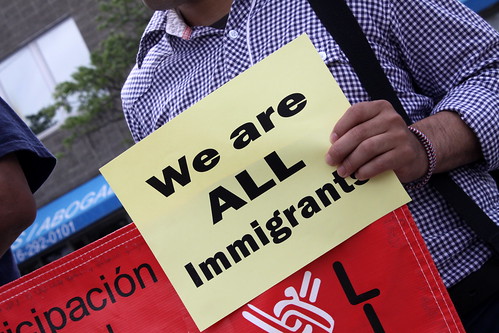From Future of Freedom Foundation
Conservatives often use the national-home argument to justify their support of a system of immigration controls. They say that America is a "national home," one owned and controlled by the U.S. government. As the owner of the "home," the argument goes, the U.S. government has the "right" to lock the door and determine who to let into its home. Conservatives sometimes say to me, "You lock your front door, Jacob, and you don't let everyone into your home. Why shouldn't the federal government have the 'right' to do the same with our home?"
The answer is that America is not a national home. Whenever I receive this argument from conservatives, I tell them that they're thinking about Cuba, where the government owns or controls everything. Since the government is the sole employer or controller of everything in the country, it stands to reason that it's going to consider the nation to be a national home, one whose door it is able to lock.
The United States, on the other hand, is founded on the principle of private property. Here, people are free to own their homes, ranches, farms, lots, businesses, and other real and personal property. Under the principles of private ownership, they have the right to do anything they want with their own property. That's because it belongs to them, not to the government.
Thus, if I want to invite a Mexican citizen into my home, that is my right. That is what private property is all about. It's mine, not the government's. It is also freedom of association is all about, which is an essential aspect of liberty, which is a fundamental, natural, God-given right, one that precedes government. As such, neither the government nor anyone else can interfere with who I decide to invite into my house. I am free to unlock and open my door to anyone I want.
The same holds true for any business I own. It's mine, not society's and not the government's. As such, I have the right to employ anyone I want, including Mexican citizens. It's my money, not society's and not the government's. If people don't like the fact that I'm hiring Mexican citizens in my business with my money, they don't have to patronize my business. They can go elsewhere.
By the same token, however, that doesn't mean that such foreigners have the right to enter your home or business. You have the right to keep your door locked. You have a right to post a "No Trespassing" sign on your yard. The right of freedom of association naturally encompasses the right of freedom to not associate.
Conservatives often accuse us libertarians of opposing borders. They're wrong. We don't oppose borders. We simply support the right of people to freely cross borders. Simply because people are free to cross borders doesn't mean that borders disappear. It simply means that people are free to cross them.
For example, every day countless Marylanders cross the Potomac River and enter Virginia. No one knows how many because the government doesn't keep track. Some of them might be coming to Virginia to steal jobs, open businesses to compete against Virginia businesses, sell things in competition against Virginia companies, sell or buy things, increase the trade deficit between Maryland and Virginia, or even murder, rape, steal, or commit an act of terrorism. None of that is enough to justify letting the Virginia government begin controlling the border.
Conservatives often confuse the term "border" for boundary lines that demarcate private real estate. Borders are a political construct that demarcate different political jurisdictions. Boundary lines demarcate the real estate that people privately own. The fact that we libertarians favor open borders doesn't mean that we favor a right to trespass onto people's private property by crossing the boundary lines that demarcate private property.
What conservatives don't get is that the mere act of crossing a border doesn't violate anyone's rights. It's only when one enters onto someone's privately owned property that one's rights are violated. For example, think of all those Marylanders crossing the Potomac and entering Virginia. They aren't violating anyone's rights when they cross the border. If they enter Virginia and then break into someone's home, they are violating the law because they are violating someone's rights.
Thus, when a Mexican crosses the border by trespassing on someone's ranch, he is violating the landowner's rights by trespassing onto his property. If the foreigner were free to cross the border on a road or bridge, he would not be violating anyone's rights, any more than a Marylander is violating anyone's rights when he crosses the Potomac and enters Virginia. Keep in mind that the only reason the foreigner is trespassing on someone's ranch on the border is because of the system of immigration controls. If borders were open, foreigners would be crossing the border the same way that Marylanders cross the border and enter Virginia.
Some conservatives argue that if all the roads were privately owned, the private owners would discriminate against foreigners by refusing to let them travel on their roads. Therefore, they say, the government, as the owner of the roads, should prohibit foreigners from using when or after they cross the border. They are just projecting their own prejudices. After all, millions of Americans are renting or have sold housing to an estimated 11 million illegal immigrants here in the United States. Moreover, countless businesses have hired most of those 11 million.
Why do homeowners and business owners do that? In large part because they like the color of money. There is every reason to believe that private owners of roads would be equally inclined to like the color of money. Nonetheless, as long as government owns the roads, we Americans should continue standing fast and refuse to permit the government to discriminate against anyone on the basis of race, color, creed, sex, or national origin. Anyone should be free to use the government's roads.






